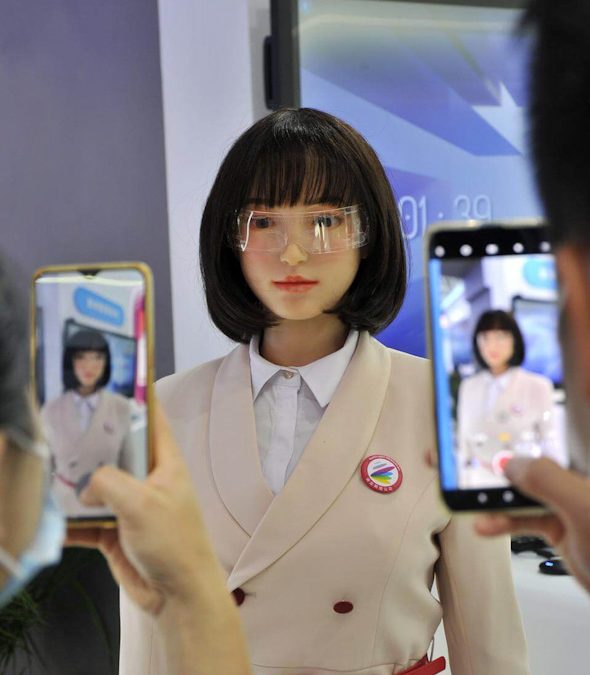Twenty-six years after the first-ever item was ordered online at Amazon (according to Amazon historians, it was a copy of the book “Fluid Concepts And Creative Analogies: Computer Models Of The Fundamental Mechanisms Of Thought” by Douglas Hofstadter) the e-tailer has generated over 2 trillion US dollars in worldwide sales. For many, online retail has now passed the point of no return and digital trends show what is next.
The exponential growth in online shopping, exacerbated by the coronavirus pandemic, has flicked a switch for many consumers.
With governments worldwide enforcing the closure of stores and implementing lockdowns to restrict social movement, often for months at a time, in a bid to combat the coronavirus, more and more people are resorting to online shopping. To date, the man who made that first sale at Amazon – Jeff Bezos, has seen his fortune grow by nearly $24 billion, due to increased consumer demand for Amazon’s products and services during this pivotal time.
In 2020, e-commerce accounted for 27.9% of all UK retail sales, up from 19.2% in 2019 (ONS), digital trends upward for e-commerce. Since March 2020, UK consumers have been receiving an average of seven deliveries per month for the past year, compared with five previously (Barclaycard Payments).
Experts predict that the impact of the coronavirus will not just provide a short-term boost to eCommerce, but one that’s here to stay, post-pandemic, as people become accustomed to the ease and convenience offered by online.
Time spent online reached a record high in 2020 (Ofcom), with users not just spending more time shopping but on gaming, streaming, and social media apps too.
As brands vie for position in an ever-crowded online space, research has found that it takes a user just 0.05 seconds to form an opinion on a website (T&F Online) and 38% of people will stop engaging with a website if the content or layout is unattractive (Adobe).
Whilst some online retailers are still struggling with outdated and cumbersome websites that sit like ‘catalogs online’, there are some fascinating developments in the ways in which brands are using the online space and ever-evolving technology that is available, to better attract and serve their customers.
Artificial Intelligence (AI) is powering new product discovery platforms to deliver enhanced site search, analytics and hyper-personalized online shopping journeys, based on consumer needs around product look, feel and function as well as digital trends.
‘Searchendising’ intuitively breaks down search terminology to provide smarter and better recommendations for products and services, whilst hyper-personalization allows for a greater understanding of the shopper’s aesthetic tastes and desires.
This micro-exploitation of data through AI will enable retailers to anticipate each shopper’s expectations, personalizing the online experience in line with this and closing the sale.
The world of data and its worth is not a new phenomenon – but it is certainly a powerful one and often cited as the ‘oil’ of the 21st century and the digital trends continue to raise.
Social media will also play a continually evolving role in e-commerce, providing a discovery and engagement platform for brands, all of course, with the help of influencers. Not only will this enable well-established brands to continue to reach consumers, but emerging ones too. Evidence suggests that there is a growing number of consumers who are open to purchasing from independent businesses – according to Shopify, 57% say they’re willing to shop with new brands for the first time (2020). An enhanced focus on sustainability and environmental practices has also seen consumers use online search to seek out those businesses aligned to their values and ethics.
This enhanced use of technology isn’t limited to online retail. Gaming companies are also using AI and Virtual Reality (VR) technologies to enhance and personalize the gaming experience. Luxury fashion brand Burberry has recently designed outfits, known as ‘skins’ for one of China’s biggest video games Honor of Kings, which are available for players to buy and adorn their characters with.
Online casinos are also transforming the user experience through the use of VR, providing interactive experiences for users, including realistic slot machines, 3D interfaces to properly mimic a physical casino environment and the ability to chat with dealers and other players. This all makes for an immersive gaming experience from within the home and will also influence and demonstrate how online retail evolves in the coming years.
As firms continue to maximize the latest innovations and user data to enhance the online experience, from gaming to shopping, the delivery of a hyper-personalized experience and more, for every individual is possible. As AI seeks to anticipate customer needs before they even arise, the possibilities around online experience become endless and stretch beyond the realm of imagination. But brands must ensure this exciting technology is carefully understood and properly utilized, with the customer experience remaining firmly at the heart. Eliezer Yudkowsky said, “The greatest danger of Artificial Intelligence is that people conclude too early that they understand it” and brands must not fall into the pitfall of ‘tech for techs sake.
Article Provided By Forbes
![]()
If you would like to discuss Your Logo with Mojoe.net or your website’s analytics, custom logo designs, social media, website, web application, need custom programming, or IT consultant, please do not hesitate to call us at 864-859-9848 or you can email us at dwerne@mojoe.net.


Recent Comments